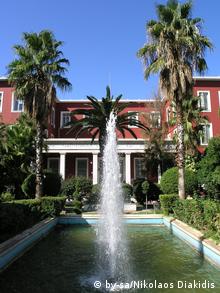ects that never existed
EU funds for projects that never existed
It's difficult to reconstruct how much money from EU funds going to Greece has been misused. Complex administration structures and a lack of control mechanisms make it even harder to prosecute embezzlement cases.
It was one of the most spectacular and controversial processes for Greece to undergo in recent years. Nine professors and high-ranking officials at Athens' Panteion University were sentenced to long prison terms for embezzlement. A Greek court found they had misused 8 million euros ($9.8 million) in research funds during the 1990s.
The guilty included former rector Dimitris Konstas, who also served as head of the Greek delegation to the Council of Europe, as well as vice-rector Panagiotis Getimis, who earned his doctorate in Germany.
Ferraris bought with research funds
More and more juicy details of the Panteion affair have surfaced in recent years. Top university accountant Anastasios Koutsodimitropoulos bought a red Ferrari using what amounted to 80,000 euros ($980,000) in research money. That's according to a 2007 report in the Athens newspaper Kathimerini. Ten times as much money was embezzled from research budgets and spent on rugs, marble bathrooms, and furnishings for holiday apartments.

The Panteion university where the embezzlement took place
The convicted parties did not question that fraud took place, but maintained the funds did not go to them. After the verdict was delivered, vice-rector Getemis called it a "politically motivated sentence," and assured he was going to take every legal means right up to the European Court of Human Rights.
Ioannis Tsoukalas, a professor of physics and conservative member of the European Parliament, is astounded by this kind of audacity. "People in leadership positions should know what's happening in their sphere of responsibility," he says. But he knows that there are more cases like the Panteion one. "Recently, I read in the media that the vice-rector of the University of Thessaloniki gave an iphone as a gift to an actress friend of his, and then booked it as an operating expenditure."
Bureaucracy favors corruption
Criminal actions like in the Panteion affair are only the tip of the iceberg. It's the overflowing bureaucracy in Greece that makes it so easy to embezzle EU funds. From 2004 to 2008, Ioannis Tsoukalas served as Secretary General for Science and Technology in the Greece Ministry of Economics and had to look on as the funds for research and development - almost entirely financed by the EU - were split into almost 2,750 small research projects. More than 15,000 files were generated in the process.

"Every one is happy because they get at least a small part of the pie," Tsoukalas said
Because this was standard procedure, says Tsoukalas, it had two effects: "For one, everybody is happy because they get at least a small piece of the pie. But also, the administrative effort becomes huge and almost impossible to control." He says he became suspicious more than once when he served with the ministry, and reported six cases of supposed embezzlement to the district attorney's office. "Since then, nothing has happened," says Tsoukalas.
Greek media rarely report on cases of embezzlement of EU funds. But upon a query from the German newspaper "Süddeutsche Zeitung," the EU-anti-corruption body OLAF said in November 2010 that it was investigating cases of embezzlement. About a year later, OLAF-experts reported on an alleged cartel that had obtained by fraud over 50 million euros ($61.3 million) for research projects that never existed. There were suspects in all EU countries, including France, Austria and Greece, the experts said.
In light of the escalating financial crisis, discussions about irregularities and wrong priorities in spending EU funds are being taken up in Greece. But all discussions lack details and hard facts.
EU funds for useless and made-up projects
And it's not only within the research sector where EU funds have been disappearing. According to the Greek newspaper "Ta Nea", Greece has received some 90 billion euros in EU funds, but big parts of that went down the drain in economically useless or simply made-up projects. "You won't find a study in Greece looking at where exactly the EU billions were flowing to," said Tsoukalas. "Of course, you can look at all highways, airports, subway systems and other infrastructure projects and notice that a lot of things have been built with that money, which is benefiting the country. But you won't get an overview of the total costs and the projects' exact status of implementation."

Olive oil cooperatives were accused of fraud as well
One prime example are all olive oil cooperatives, especially those based on the island of Crete, says newspaper "Ta Nea". In the 80s and 90s, those cooperatives had reported a higher production output to Brussels compared to what their actual figures were to receive more subsidies. But since there are no control mechanisms yet in place for EU agricultural subsidies, this accusation was hard to prove. And even though the olive oil producers started using a database to document their demands, it is run by the cooperatives themselves and could be easily manipulated, states "Ta Nea".
Author: Jannis Papadimitriou /srs, sst
Editor: Andrea Rönsberg

No comments:
Post a Comment